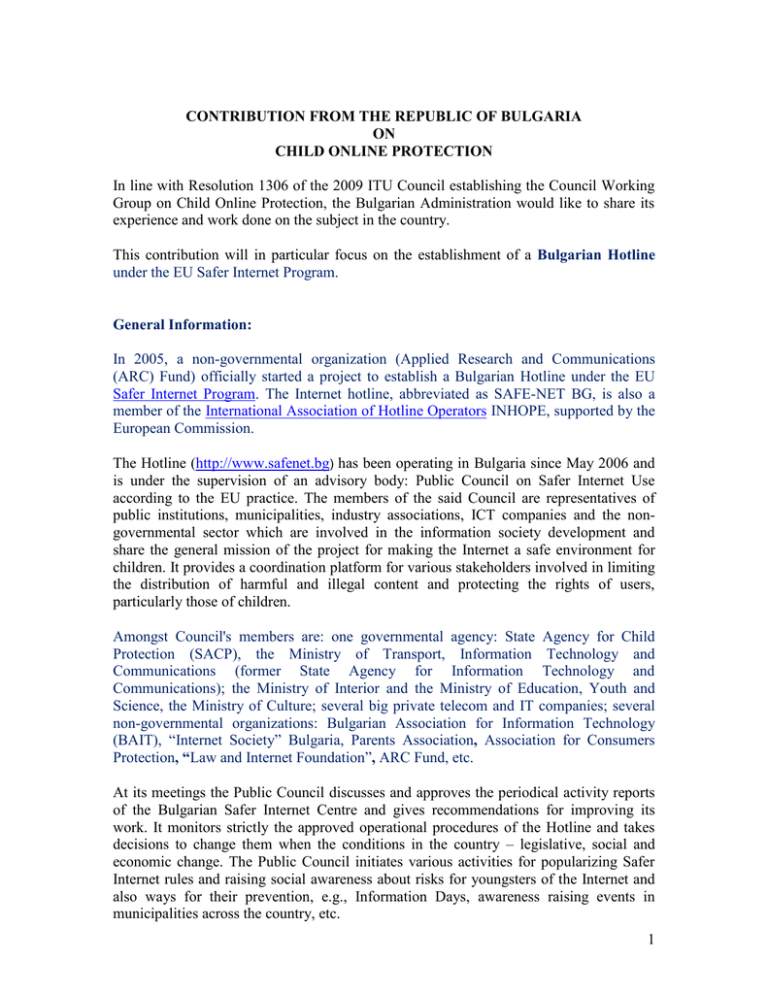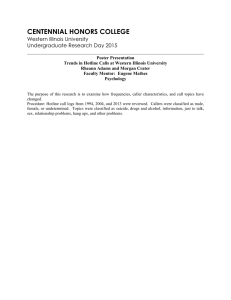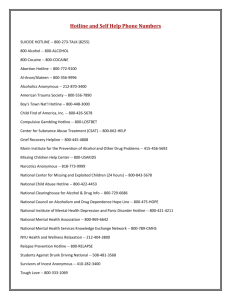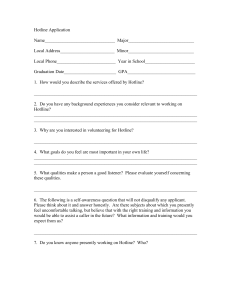
CONTRIBUTION FROM THE REPUBLIC OF BULGARIA
ON
CHILD ONLINE PROTECTION
In line with Resolution 1306 of the 2009 ITU Council establishing the Council Working
Group on Child Online Protection, the Bulgarian Administration would like to share its
experience and work done on the subject in the country.
This contribution will in particular focus on the establishment of a Bulgarian Hotline
under the EU Safer Internet Program.
General Information:
In 2005, a non-governmental organization (Applied Research and Communications
(ARC) Fund) officially started a project to establish a Bulgarian Hotline under the EU
Safer Internet Program. The Internet hotline, abbreviated as SAFE-NET BG, is also a
member of the International Association of Hotline Operators INHOPE, supported by the
European Commission.
The Hotline (http://www.safenet.bg) has been operating in Bulgaria since May 2006 and
is under the supervision of an advisory body: Public Council on Safer Internet Use
according to the EU practice. The members of the said Council are representatives of
public institutions, municipalities, industry associations, ICT companies and the nongovernmental sector which are involved in the information society development and
share the general mission of the project for making the Internet a safe environment for
children. It provides a coordination platform for various stakeholders involved in limiting
the distribution of harmful and illegal content and protecting the rights of users,
particularly those of children.
Amongst Council's members are: one governmental agency: State Agency for Child
Protection (SACP), the Ministry of Transport, Information Technology and
Communications (former State Agency for Information Technology and
Communications); the Ministry of Interior and the Ministry of Education, Youth and
Science, the Ministry of Culture; several big private telecom and IT companies; several
non-governmental organizations: Bulgarian Association for Information Technology
(BAIT), “Internet Society” Bulgaria, Parents Association, Association for Consumers
Protection, “Law and Internet Foundation”, ARC Fund, etc.
At its meetings the Public Council discusses and approves the periodical activity reports
of the Bulgarian Safer Internet Centre and gives recommendations for improving its
work. It monitors strictly the approved operational procedures of the Hotline and takes
decisions to change them when the conditions in the country – legislative, social and
economic change. The Public Council initiates various activities for popularizing Safer
Internet rules and raising social awareness about risks for youngsters of the Internet and
also ways for their prevention, e.g., Information Days, awareness raising events in
municipalities across the country, etc.
1
The main priority in the Hotline activities is to fight against dissemination of child sexual
abuse images over the Internet, but in recent years grooming and cyber-bullying also
emerged as major threats to children. The social networking sites, including dating sites,
are also presenting more and more serious risks for youngsters.
Furthermore, it aims to create conditions for receiving reports for illegal and harmful
content and handling online images, primarily for child sexual abuse or violence against
children by other Internet users by filling an online form on the website of the Hotline.
After receiving the report an operator verifies the reported content, makes an initial
assessment whether it is illegal or harmful for youngsters and takes appropriate actions,
which include notifying the hosting company or organization and/or competent
authorities.
The Hotline allows consumers to actively contribute to decreasing the spread of child
sexual abuse images and other illegal and harmful for youngsters content or activities on
the Internet. Thus, users get involved in the process of creating a safer online
environment for children, which gradually increases their motivation and human
resources involved in this activity.
The Hotline acts also as a source of information for Internet users and especially, teachers
and children by providing links to information and advice on the Safer Internet Centre
portal site about prevention of online risks for children, possible technical tools (for
filtering and monitoring online content) and measures to combat illegal and harmful
content on the Internet undertaken by national authorities, the EC, other countries,
international governmental and non-governmental organizations.
Functioning of the Hotline: operational and complaints procedures:
Operational Procedures:
1. Main priority in the work of the Hotline is countering the spread of child sexual abuse
images, sexual exploitation and physical and psychological attacks against children as
well as the propagation of racism, terrorism, xenophobia, racial and ethnic hatred in
cyberspace.
2. In the event that Internet users find content of the types described in item 1, he/she can
visit the website and the Hotline to report the content by filling out the available online
form and submitting it online or reporting it by phone, fax or mail.
3. Upon receipt of the report, the automated Hotline system automatically saves the data
in the database. The operator shall acknowledge the receipt of the information to the
sender via email. If the report is received by phone, fax or mail, the operator enters it into
the database and opens a file on it.
4. A Hotline operator verifies the accuracy of submitted reports by visiting the reported
website. In the case when the operator can not access the relevant server or Web page, the
report is transmitted immediately to the Ministry of Interior for investigation.
2
5. If the information received meets the criteria of item 1, the operator of the Hotline
traces the location of the server and takes the following steps depending on the location:
A. If the server is on the territory of a Member State of the International Association of
Internet Hotline Operators INHOPE, the operator transmits the collected information to
the operator of the partner Hotline and notifies the sender of the report.
B. If the server is on the territory of a country which is not member of INHOPE the
operator transmits the report to the competent department of the Ministry of Interior,
which transmits it further through the channels of international police co-operation, and
notifies the sender. The Ministry of Interior is asked for formal notification of the action
taken - arrest, investigation, judicial proceedings, conviction.
C. If the server is on the Bulgarian territory, the operator transmits the report to the
competent department of the Ministry of Interior and notifies the sender of the report.
The Ministry of Interior is asked for formal notification of action taken, such as arrest,
investigation, judicial proceedings and conviction.
In case of harmful content, the operator transmits the report to the competent official
authority which can take appropriate action and/or hosting organization requesting the
removal of the harmful content.
The authority is asked for formal notification of action taken.
6. After removal of harmful content in the absence of further action by the competent
authorities the operator notifies the sender for the report and the file is closed.
7. Any following action by competent authorities is recorded in the report file and the
sender of the report is notified.
8. Periodically all reports - active and closed - are being reviewed and any new
developments are recorded.
Complaints Procedure:
The Hotline accepts anonymous reports from citizens who have accidentally discovered
child sexual abuse images or any harmful to children online content. The reporting person
may choose to remain anonymous or provide contact details. When contact details are
provided the sender of the report is informed about the action taken on the report. A
majority of illegal online content is based outside the jurisdiction of the Bulgarian
authorities and the Hotline does not always receive feedback from foreign authorities
about the measures taken on a report.
The Hotline team is committed to handle all reports in a professional and efficient way
and adhere to the Code of Good Practice of the International Association of Internet
Hotline Operators INHOPE.
3
If for any reason a citizen has a complaint about the manner in which the Hotline carries
out its duties, he/she may file a complaint.
The complaint should clearly indicate which report concerns. The complaint should also
indicate the reason for which the sender believes that the Hotline has breached the Code
of good practice or INHOPE or its own procedures approved by the Public Council on
Safer Internet Use. The complaint should contain the sender's full name and contact
information (at least e-mail address and a phone number). Complaints that are not subject
to verification are not considered.
If the complaint contains precise contact information, the Hotline will confirm its receipt
by e-mail and can ask for additional information. If no such information is provided, the
complaint is not considered.
In the case of a properly filed complaint the Hotline answers within 5 working days.
The Republic of Bulgaria is willing to contribute to the ITU’s initiatives regarding the
child online protection by presenting a successful practice established in the country
under the EU Safer Internet Programme. The Bulgarian experts either from the
government or non-profit organizations are available and glad to share the experience
drawn on so far with other members of the ITU community for ensuring safer internet for
the most vulnerable members of our society.
4




